With a draw in the final game, Nepomniachtchi finished the tournament on 9.5/14. In a dramatic duel which lasted five hours, Ding Liren defeated Hikaru Nakamura to clinch second place.
The final, 14th round of the 2022 Candidates didn’t promise much initially. All four games were calm, the positions even and it seemed as if we were heading for a day of draws. Instead, there was just one draw.
In terms of results, today’s round did not matter for Ian Nepomniachtchi, who secured victory in the event following a draw in round 13. However, this game was psychologically important for him: Nepomniachtchi didn’t want a repeat of the previous Candidates, which he also won with a round to spare but then lost the final game which gave a bitter aftertaste to his great success.
Playing the Petrov, Nepomniachtchi was under pressure from Jan-Krzysztof Duda who seemed much more relaxed and comfortable in his bearing compared to how he had played in the rest of the tournament. All the time the game was even. Duda was looking for chances but Nepomniachtchi always responded adequately and confidently, bringing the game to a draw without much drama.
Finishing the Candidates in the first place and without a single defeat is a strong statement for anyone vying for the title of world champion. A great achievement by Ian Nepomniachtchi.
The 24-year-old Jan-Krzysztof Duda finished the tournament on 5.5/14, in shared seventh-eighth place. In his first appearance in the Candidates, Duda showed a strong fighting spirit and ability to put the more experienced players in an uncomfortable position. However, he probably needs to work more on his confidence and willpower.
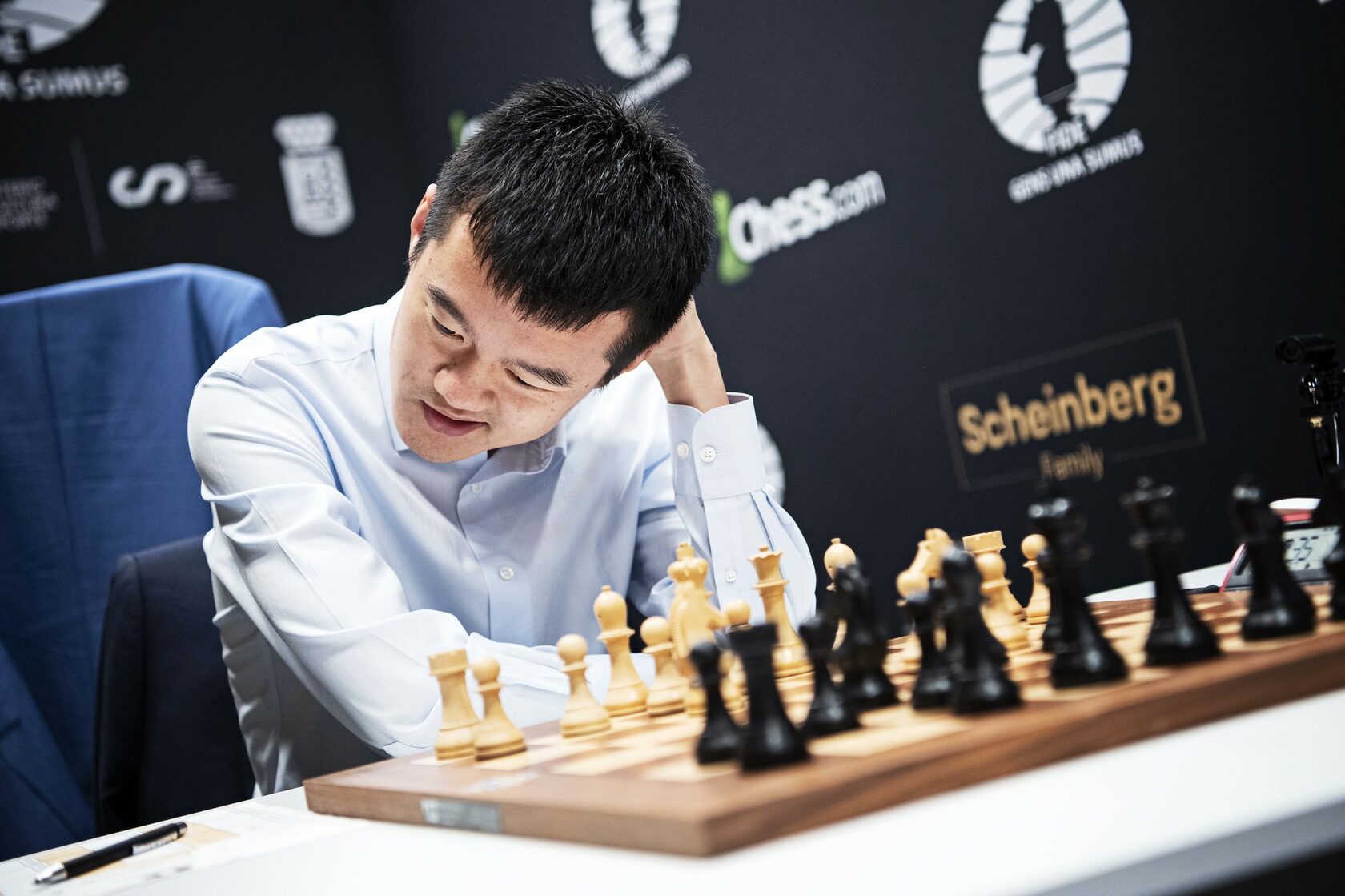
In a direct duel for second place, Ding Liren defeated Hikaru Nakamura who was leading him by half a point. Ding needed to win if he wanted to come in second, while Nakamura only needed a draw. The two played the Semi-Tarrasch which transposed into Queen’s Gambit Accepted. For the most part, the game was even. Black successfully stopped any advances from White, exchanging pieces and simplifying the position along the way. However, in the advanced stage of the middlegame, Nakamura made a blunder with 35…Bd8 allowing White to keep his rook to the seventh rank. From that moment on, it was all Ding. He played very tenaciously, not allowing Nakamura any chance of escaping. The American played till the very end, hoping for a miracle. But it never came.
A great stroke of luck for Ding who – having a very poor start to the tournament – made an amazing comeback in the second half and with this victory in the final round clinched second place, with 8/14. The second place could be relevant if world champion Magnus Carlsen decides not to defend his title. In that case, he will be replaced by the player who finished second in the FIDE Candidates Tournament 2022.
Nakamura finished in shared third-fourth place, on 7.5/14.
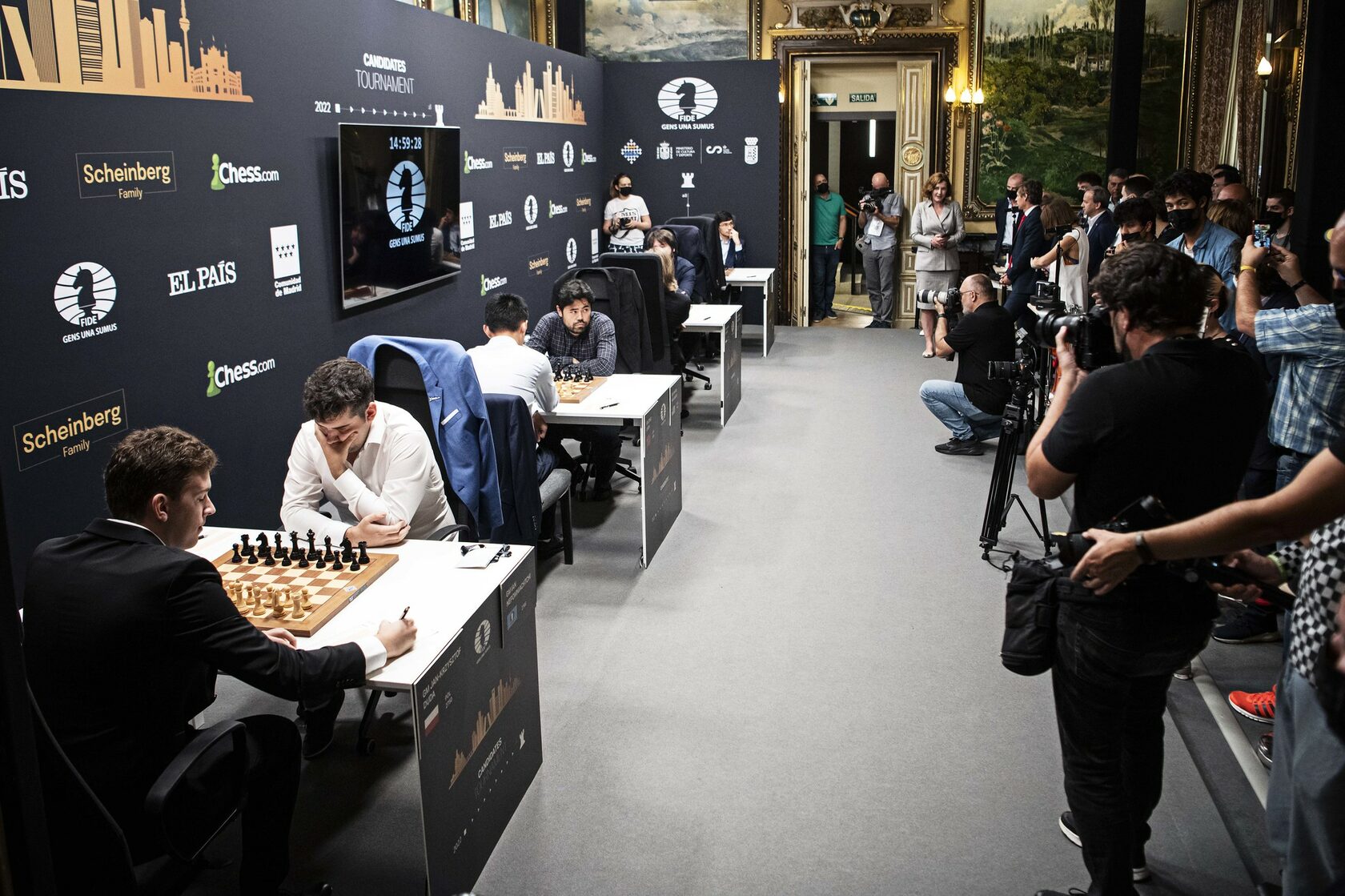
After today’s loss to Teimour Radjabov with white pieces, Hungarian Richard Rapport finishes the event in last place, on 5.5 points. In an even position in the Berlin, Rapport was overoptimistic when sacrificing a piece for an attack on the black king but ended up with nothing. Radjabov cold-bloodedly repelled the attack and scored a confident victory.
Rapport had ups and downs in this event and his place on the scoreboard is not a reflection of the play and strength he showed in the event. On the other hand, Radjabov – who spent the first part of the tournament in the lower ranks, finished with 7.5 points and in a great shared third to fourth place, with Nakamura. Despite being written off by many, Radjabov proved to be a dangerous opponent and an amazing defender.
One of the favourites to win the event, Fabiano Caruana, finished the tournament with a defeat. In a game which lasted for well over six hours, he lost as White against Alireza Firouzja. In the Berlin line of the Ruy Lopez, the position was mostly even until Caruana miscalculated in organising an attack on the black king and allowed Firouzja to take the initiative. Despite standing significantly better, Firouzja didn’t play very precisely, allowing Caruana chances to make a comeback. In the end, Caruana managed to narrow Black’s advantage and get into a position which was uncomfortable but where he could hold. Ultimately, on move 60, just upon reaching time control, Caruana made a huge blunder in the endgame and this time he wasn’t given another chance. Completely lost, he was forced to resign.
A sad ending for Caruana who had an excellent first part of the tournament, just a step behind Nepomniachtchi. However, he broke in the second part and didn’t recover until the end. With 6.5/14, Caruana finished the event in fifth place, well below his play and strength.
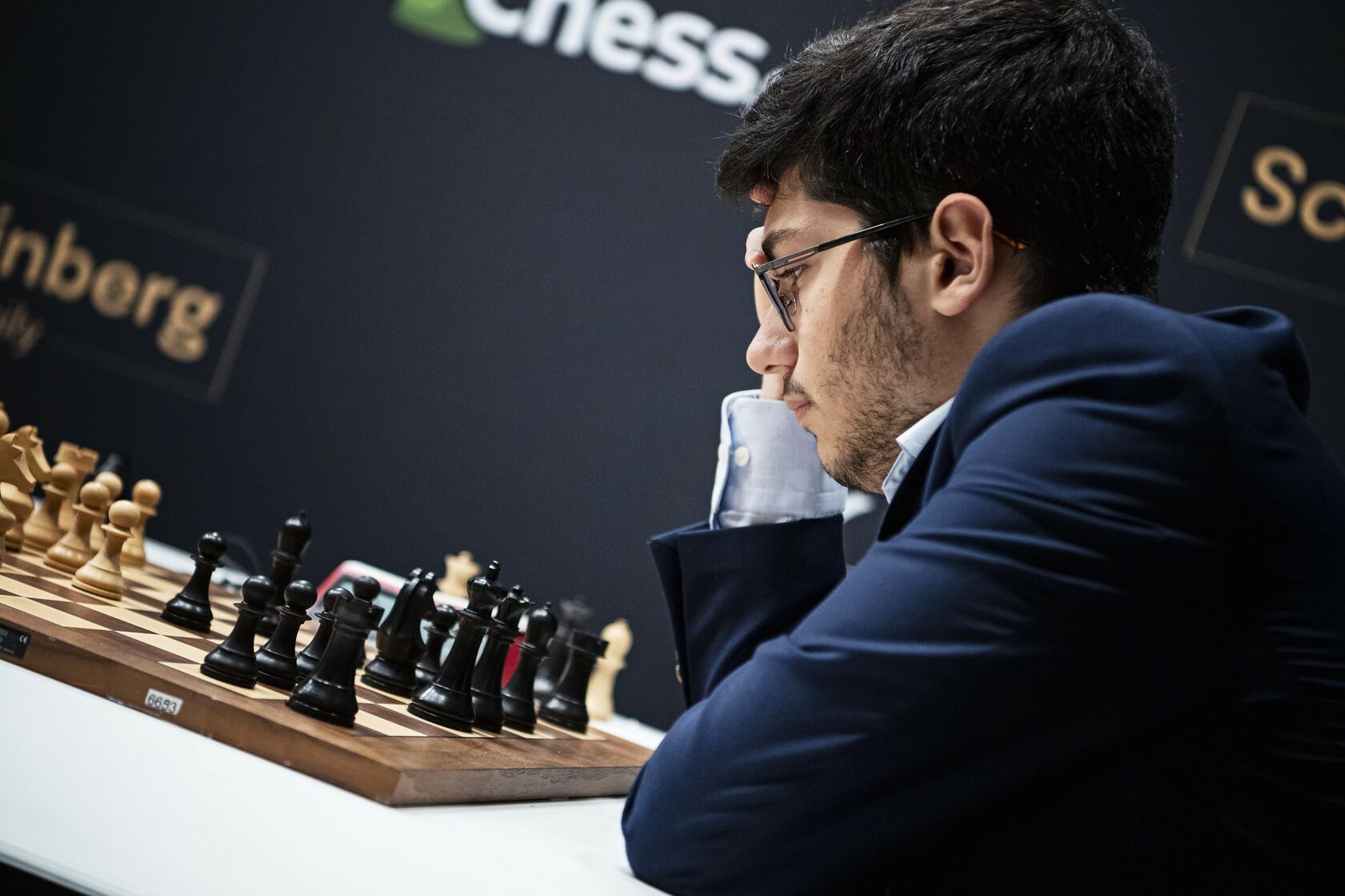
The victory against Caruana was a silver lining for Firouzja, but overall - he had a poor tournament, playing tactlessly. After holding out in the early games he crashed after the defeat from Ian Nepomniachtchi in round four and never really came back. One thing Firouzja needs and he cannot get with any preparation is maturity. How he approaches the experience from these Candidates and how he works on his character will be key to him showing his best in future events. The Frenchman finished the tournament in sixth place, with six points.
Here follows a closer look at the games from the final, 14th round of the Candidates.
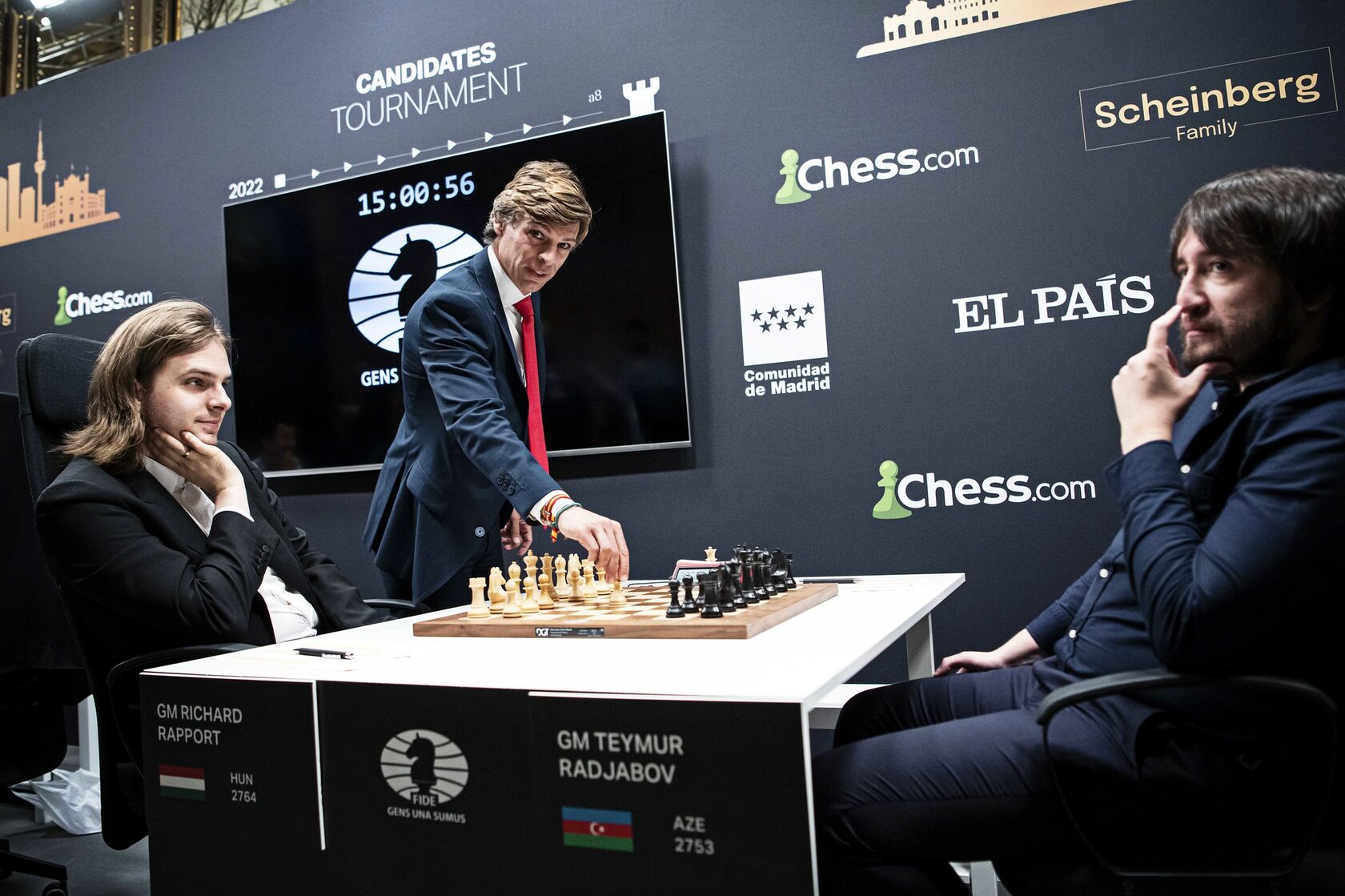
Richard Rapport vs Teimour Radjabov: Worlds apart
In the anti-Berlin, Rapport managed to gain the initiative following the opening taking full advantage of Radjabov’s imprecise play at this stage.

Rapport prepared for attacking the kingside but here he overextended with 19.g5. Instead, Nh4, followed by Nf5 gradually increasing pressure on Black, was better.
Luckily for Rapport, Radjabov took on g5 with the f-pawn instead of the h-pawn immediately giving White the advantage.

Instead of proceeding with 20.h4 opening lines on the kingside, Rapport went for a knight sacrifice - 20.Nxg5 but it did not work out for him.
After 20…hxg5 (even better was 20…Bxc4 first) 21.Rxg5 Qf6 22.Rag1 Bf8 23.Rf5 Qh4 24.Nd2 Teimour found a very strong 24…Re6! transferring his rook on the sixth rank and trading one of White’s rooks.
A few moves down the road White’s attack petered out completely. Rapport, true to his nature, tried to create some complication and eke out a draw, but Radjabov did not give him a single chance.

White’s d7-pawn was doomed, Rapport surrendered.
It was a strange twist of fate: Rapport was mostly in the middle of the board during the tournament, threatening to break to the top, but now ends the tournament in last, eighth place.
Radjabov, who spent most of the first part of the event at the bottom of the board, and who was written off by most, ends the tournament with 7.5/14 and in very good third place, shared with Nakamura who came fourth.
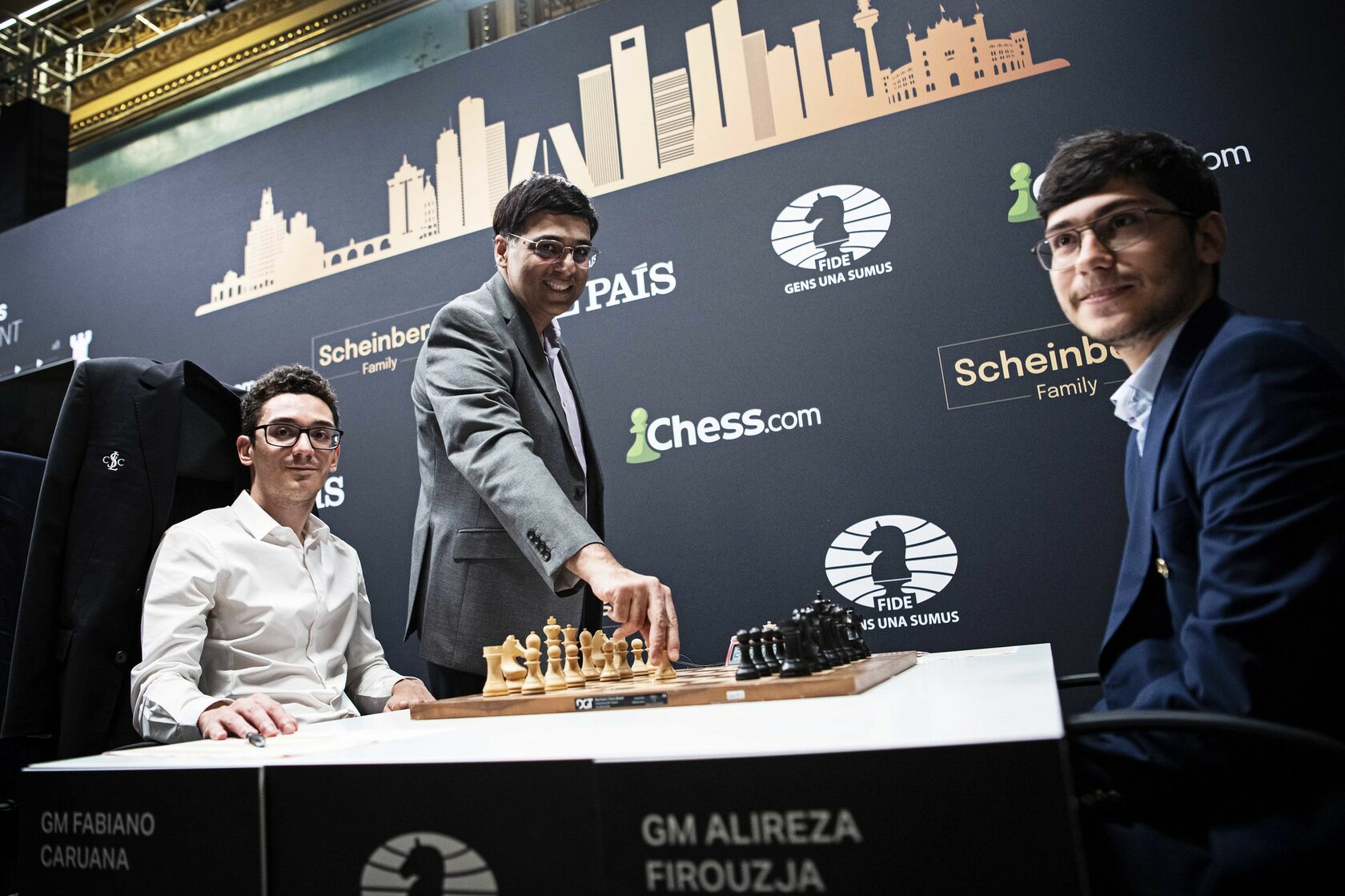
Fabiano Caruana vs Alireza Firouzja: A crushing end and a silver lining
Vishy Anand made the ceremonial first move for White. Fabiano Caruana was the firm favourite in this duel.
Firouzja opted for the Berlin Defence in the Ruy Lopez, a line in which Caruana is extremely well versed in. Caruana went for the anti-Berlin line with 4.d3. He proceeded to play sharply against Firouzja and started organising an attack on the kingside.

Here Firouzja made a premature attempt to open the game but Caruana immediately jumped at the opportunity to transpose into a position with a strong knight on e4 against Black’s dark-squared bishop.
White had slightly more initiative but Firouzja was playing carefully – not overstretching his pawns and pieces as he had in previous games. He secured his king, aligned his rooks on the f-file, the queen on g6 and proceeded to push his h-pawn towards the white king’s fortress. Still White had a long-lasting edge thanks to his well-positioned knight on e4.

Surprisingly for many, Caruana pulled the ground from under his knight and played 27.d4. This strange decision was followed by a few substandard moves by Fabiano. As a result, he found himself in a precarious situation.

After 37…Bxf4 Black was winning, but Firouzja played 37…Rhxf4 and gave Fabiano some breathing space. Still, the endgame was highly unpleasant for White although Caruana had some defensive resources.

Here Firouzja gave an important tempo to White. Instead of proceeding with his king to d5 and onwards, he played 47…c6 and after 48.h4 Bd8, his advantage melted away.
Firouzja didn’t play precisely in the endgame and Caruana managed to exchange the kingside pawns and got very close to a draw. The simplest way was to put his knight to c4 and move the king to the queenside. However, just as he was about to reach the second time control, Caruana made a terrible mistake on move 60 and was instantly lost.

Fabiano just played 60.Nd2-e4?? which was met with 60…Rh3+ 61.Kd2 (61.Kc4 fails to 61..Rh4! 62.Kd3 c4+ - maybe Fabiano missed this subtlety) 60..Kd5.
Within a few moves, after six hours and 20 minutes, Caruana resigned. A crushing loss and a devastating end for the former winner of the Candidates and a silver lining for Firouzja.
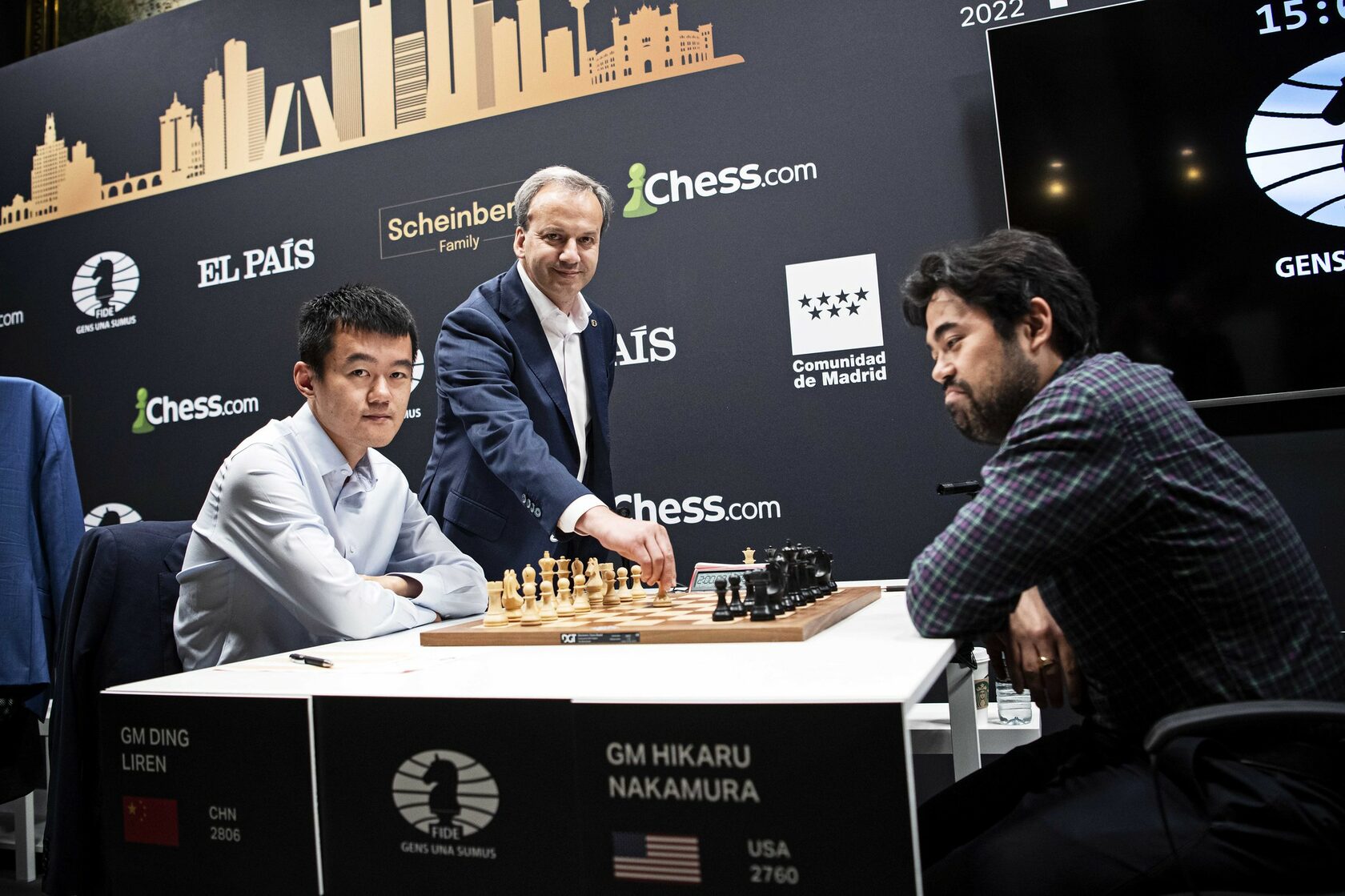
Ding Liren vs Hikaru Nakamura: A twist of fate
This was the most important game of the round. Nakamura was in second place with 7.5 points, while Ding was third on seven. A draw would be enough to secure Nakamura’s position as the runner-up, while only a victory worked for Ding.
Ding was White and he was under pressure to win. The first move on the board was made by FIDE President Arkady Dvorkovich.
The game started as a walk through several openings. Following 1.d4 Nf6, it was looking like they were heading for a Nimzo/King’s Indian, then the two entered the Semi-Tarrasch but ended in the Queen’s Gambit Accepted after Hikaru played 4…c5.
After White executed a standard operation of trading his c3-night Black’s f6-night on the central e4-square Black responded with 14…f5, dislodging the bishop. By simplifying the position, Nakamura was closer to his desired result.

The pressure was on Ding in this game to create some chances. He spent almost half an hour thinking before playing 15.Bb1. It was the best choice in the position (with the alternative being to go on c2 or play on c6). However, an exchange of queens followed, which played into Nakamura’s hands as the position was very solid.
White attempted to gain some initiative on the queenside but Nakamura held things together. Ding avoided the exchange of pieces and was looking for a chance but Nakamura gave him none. He had to be careful not to over-push, especially as he was weaker on time.
Finally, several pieces were exchanged and they transpired to the following position.

In this case, taking on c5 would lead to simplifications but would have given chances for White. Nakamura, therefore, played 30…Nf6.
After 31.Bd6 Ng4 32.Bc5 – to open the d-file for the rook to come to d7, but Nakamura proceeded with 32…Bh4 attacking the f2 pawn. Ding instantly played 33.Rd7 as that offered him most chances.
After 33…Kg8 34.g3 Bg5 35.Kf1 the position was still even but it wasn’t that simple. Both sides had to remain focused. But…

In this position, Nakamura should have played the logical 35…Rd8 offers the exchange of the rooks as 36.Ra7 (for example) fails to 36…Rd3. Instead, Nakamura made a blunder with 35…Bd8 handing the advantage to White.
Ding responded with a logical 36.Rb7 and Nakamura found himself in deep trouble. He played 36…f4 looking for counter-chances and somewhat surprisingly succeeded as after 37.gxf4 exf4 and instead of taking, Ding played 38.e4, partly dropping the advantage.
Nakamura’s best chance was advancing his pawn to f3, pinning the king on f1. Instead, he played 38…Bf6 and after 39.Nd4 Ding was in control again.
Black was looking for complications, but it was to no avail as Ding demonstrated deadly accuracy. Hikaru even advanced his pawn to f3 but it was way too late. Ding’s pieces were positioned excellently – holding his own and pressing Black.
The final portion of the game was about winning a won position. After just over five hours of play, Nakamura resigned on move 58. With this victory, Ding secured second place in the Candidates.
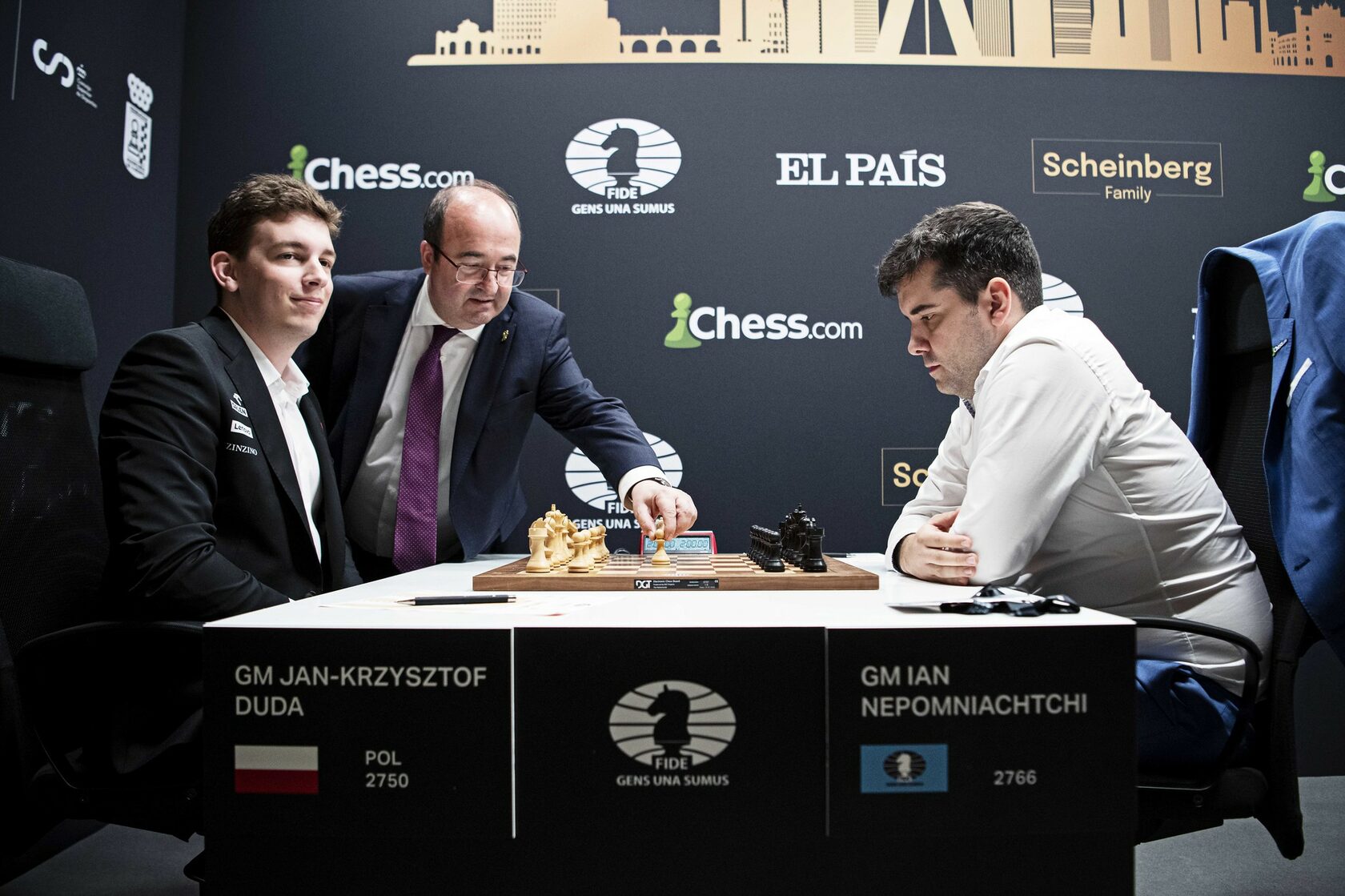
Jan-Krzysztof Duda vs Ian Nepomniachtchi: Nepo singing out without a defeat
This was a game which had no impact on the result but was more important for Nepomniachtchi in terms of saving face. By this round he had already won first place, so even a defeat wouldn’t impact his victory. However, he didn’t want a repeat of the Yekaterinburg Candidates where he also won with a round to spare and then lost to Ding in the last round.
The winner of the Candidates opted for his trademarked Petrov and the opponents got out of the book as early as move 9. Duda gave the impression of being better prepared for the opening: he was blitzing his moves while Nepomniachtchi spent a lot of time thinking about his responses.

White just pushed his pawn to h4 revealing his aggressive plans on the kingside. Black now needed to neutralise his initiative and he pressed in the centre 14…c4 15.Bc2 and then Nepomniachtchi played the non-obvious 15…a5 instead of the more logical 15…d4, forcing Duda to get into his first long think.
After a 35-minute long reflection, Duda played 16.h5.
The logic behind Nepomniachtchi’s move …a5 came was obvious when he played 16…Ra6, to bring his rook into the game, covering the sixth rank. Nepomniachtchi then pushed his pawn to d4 which unleashed a chain of exchanges which lead to a critical position in the entire game.

Duda had a very interesting option 23.Rxd8 Bxd8 24.Rd1 Be7 25.Nf6+. It turns out that Black has to give up an exchange - 25…Rxf6 as 25…Bxf6 26.exf6 is way too dangerous. Black has two pawns for an exchange in this line but White plays from the position of strength.
The Polish GM exchanged his h-pawn aiming for a concrete line with a bishop sacrifice.

Here Duda implemented his idea - 26.Bxg6 fxg6 27.Qe4 Kg7 28.Rb1 threatening to get down to the seventh rank. Nepomniachtchi wasn’t phased and he played 28...Bd5! forcing the exchange of the queens. After 29.Rx2 Bxe4 30.Nxe4 Rb6 the opponents traded the rooks and ended up in an even knight and bishop endgame. It did not take them long to sweep most of the pawns off the board and split a point on move 44.
Duda had some chances in today’s game, but Nepomniachtchi made sure nothing came of any of them.
After three hours and 40 minutes of play, Ian Nepomniachtchi and Jan-Krzysztof Duda finished their last game in the Candidates. Nepomniachtchi made history by winning the Candidates with a confident 9.5/14 and without a single loss.
The Closing Ceremony of the 2022 Candidates will take place on Tuesday 5th of July at 9 PM at the Four Seasons Hotel in Madrid.
